Diogenes
of Synope (c. 412-323 BC)
Diogenes, who was a contemporary of
Plato and Aristotle, laid out an important part of the Hellenistic world-view
with his Cynicism. Please note: the Cynicism of the originator
of this philosophy, Diogenes, had little in common with what we today understand
as cynicism.
Even before Philip and Alexander
had arrived on the Greek scene – the constant warring among the Greeks,
the hunger of Athens for power and dominion over its neighbors, the general
sense that things were not right politically in Greece – had caused Diogenes
to begin to look to inner or personal integrity as a substitute
for lost public integrity (which had once been the focus of the
moral life in Greece).
He felt that the happiest life is
one in which we live our simplest – in accordance with the most basic ways
of nature. Diogenes had seen too much evil come from the Athenians'
growing love of money, status and power – and took a militantly hostile
position against such things, mocking those who chased after them.
Diogenes noted that animals, such as a dog, live quite contented lives
without having to have the various material and psychological adornments
of civilization that we think are so necessary for life. As he himself
went around as a "natural" person (some said that his ascetic life resembled
more that of a dog than a man!) he became identified as the kuon
or kyon, meaning "dog," and his philosophy as that of the "cynic"
(from kyon).
Crates
of Thebes
Crates was one of Diogenes' students
who gave away his fortune in order to follow the simple ways of his teacher – in
order to help others free themselves from the bondage to the kind of materialism
that gripped at Greek society in his days. Crates was a kindly and
generous individual who had a more loving and less reproving way about
his cynicism – which endeared him to many Greeks and won a number to the
cause.
Pyrrho
of Elis (ca. 360-270 B.C.)
Pyrrho is considered the founder of
the Greek school of skepticism. He was the first to break seriously
with the intellectual tradition of Socrates, Plato and Aristotle – in their
quest for knowledge. Not only did Pyrrho feel that true knowledge
was unattainable, but he felt that people are freed to live a truly happier
life if they do not frustrate themselves with pointless intellectual pursuits,
but learn to live through emotional self-discipline in a state of contentment
with things as they simply present themselves to us.
His answer to the accusation that
his theories on life left us with no moral absolutes was simply that we
ought to live by time-honored traditions that seemed to have worked out
for us over the long run. While we could never state with absolute
certainty that such traditions were ultimately true or good, they seemed
to have proven themselves in their simple workability. That ought
to be a sufficient reason for following them. Certainly to Pyrrho,
following traditions was a lot safer than going after new, radical ideas
that had only untrustworthy intellectual reason to justify themselves.
Thus a conservative social agenda tended to go with this early skepticism.
 Epicurus
(342-270 BC)
Epicurus
(342-270 BC)
As is well known, Epicurus, the founder
of the philosophy that bears his name, advocated the pursuit of pleasure.
But in his definition of pleasure he intended something that had little
in common with what we today so often identify as pleasure. In keeping
with the traditions of Greek philosophy in early Hellenistic times, he
understood pleasure as attaining freedom from the pains and hurts of life
through the practice of virtuous living.
However, unlike Socrates, he did
not feel that virtue was a good in itself, worthy of devotion because of
its superior qualities. He never looked deeply into the question
of virtue's great, even divine, qualities. Rather he recommended
focusing on living a virtuous life because it was able to produce pleasure – freedom
from pain. It was in the ability to produce pleasure that virtue
achieved its worth. Virtue was not the highest good. It was
merely the means to the highest good, which was pleasure.
He also believed that we should focus
our energies and thoughts on the material life immediately before us – and
not waste time speculating about life after death. To him there probably
was no such existence. In part this was due to his materialistic-atomistic
cosmology (much like Democritus') which saw life as a result of atoms moving
through space in such a way to form the stars, planets, the earth, and
all upon the earth, including ourselves. This process was all determined
by mechanical laws – not by any kind of gods.
 Epicurus'
major works or writings:
Epicurus'
major works or writings:
Letter to Menoeceus
Principal Doctrines
Letter to Herodotus
Letter to Pythocles
On Nature
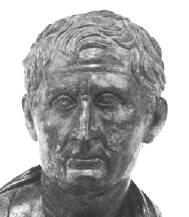 Menander
(342-291 BC)
Menander
(342-291 BC)
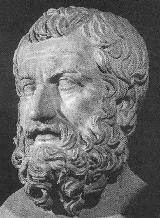 Zeno
of Citium (336-264 BC)
Zeno
of Citium (336-264 BC)
Zeno, sometimes called "the Phoenecian"
was born in Citium in Cyprus. But he came to Athens as a young man
and lived there for the rest of his life – without ever becoming a citizen
of Athens. He studied in the various philosophical schools of Athens
and under different masters (including the Academy that Plato had founded
earlier). For a time he was most attracted to the Cynicism of his
teacher Crates – and eventually began to teach the subject in the Painted
Stoa (Porch) in the Athenian market. [It was from his teaching in
the Stoa that the name for his philosophy, Stoicism, eventually developed.]
But he added his own touches to the
teachings of his master Crates – especially elements that had quite Eastern
elements to them. In the uniqueness of his teachings he truly set
out a new philosophical course – a blending of Greek philosophy and Eastern
mysticism.
We know that his interest was primarily
ethical – in the manner of Socrates, whom he supposedly honored greatly
in his teaching. He, like Socrates, was quite confident of the powers
of disciplined human reason to secure both deep insight into the cosmos
and happiness in a person's own life.
That confidence was clearly based
on his belief in the supreme existence of Divine Reason (the Logos),
the ultimate reality behind mere appearances. He taught that human
mind could – and most certainly should – attach itself to this Logos in pure
devotion.
He taught further that the only path
to human happiness for a person came through complete personal self-mastery,
in particular of the mind over the body, and especially as the mind was
led to contemplate the higher realities of the Logos. Zeno taught
his students to seek the ability to quiet the body's cravings so as to
become totally focused on this devotional union with the Logos.
This quieting of the body – and of the mind – furthermore was expected to
be possible (importantly so) in the face of particularly difficult human
circumstances.
This "quietism" ultimately became
the hallmark of the Stoic.
Cleanthes
of Assos (331-232 BC)
A disciple of Zeno's who lived the life
of poverty in pursuit of the Stoic ideal. Though he was not quick-witted,
he was so faithful in his idealism that he became Zeno's natural successor.
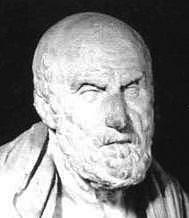 Chrysippus
(ca. 280-207 B.C.)
Chrysippus
(ca. 280-207 B.C.)
Stoic philosopher who deified the world
as "God," especially in the world's more rational or logical features.
Polybius
(ca. 200-118 BC)
A Greek scholar and politician, who
wrote a history about the rise to power of Rome. When Macedonia was
defeated by Rome in 168 BC he was brought as a political prisoner to Rome.
But he was able to use this misfortune to intervene on behalf of his Greek
compatriots to secure fairly gentle treatment by the Romans of the Greeks
(the Romans tended to be quite impressed with Greek civilization anyway.)
Living there another 18 years, and
becoming part of the political circle of the powerful Scipio family, he
became familiar with a number of Roman notables. Thus when he eventually
wrote the story of Rome's rise to power (40 volumes covering the period
up to the final conquest of Greece in 164 AD – only the first 5 volumes
having survived to today), he did so with particular insight.
 Polybius'
major works or writings:
Polybius'
major works or writings:
Histories
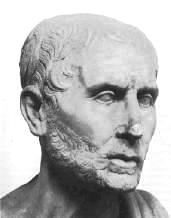 Posidonius
of Apamea (c. 135-50 BC)
Posidonius
of Apamea (c. 135-50 BC)


 Early
Hellenist Philosophers
Early
Hellenist Philosophers Development
of the Physical Sciences
Development
of the Physical Sciences Roman
Contributions to Philosophy
Roman
Contributions to Philosophy Later
Hellenist Philosophers
Later
Hellenist Philosophers The Hellenist and Roman Ages: A Full History
The Hellenist and Roman Ages: A Full History


 Zeno
of Citium (336-264 BC)
Zeno
of Citium (336-264 BC)


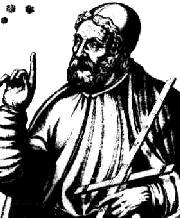



 Plotinus
(204-270 AD)
Plotinus
(204-270 AD)
